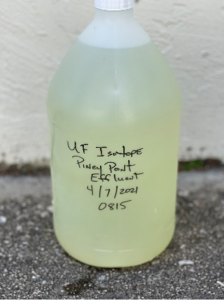Gainesville, Fla. – Scientists in the University of Florida’s newly established Center for Coastal Solutions (CCS) and collaborators from the Ocean Conservancy are researching and tracking the ecological effects of the Piney Point reservoir leak into Tampa Bay.
Over the past week, millions of gallons of wastewater were discharged into Tampa Bay, which could cause algal blooms among other effects, leading to the depletion of marine life.
The collaborative effort will identify where critical research gaps exist in current plans. Since the formation of the partnership Elise Morrison, Ph.D., an environmental engineering sciences assistant professor, in the Engineering School of Sustainable Infrastructure & Environment (ESSIE) has collected samples to analyze per- and polyfluoroalkyl substances (PFAS) substances and any other emerging contaminants. Andrew Altieri, Ph.D., an environmental engineering sciences assistant professor in ESSIE, plans to support the Sarasota Bay and Tampa Bay Estuary programs with their assessment of the changes in macroalgae and seagrass abundance in the water.
Personnel at Florida Sea Grant, Tampa Bay Estuary Program, and Sarasota Bay Estuary Program were instrumental in obtaining initial samples. Coordination is ongoing for future sample collection with these critical partners.
For further information, please contact Christine Angelini, Ph.D. by email at c.angelini@ufl.edu.
Other contacts for the following topics:
- Nutrient source tracking with stable isotopes – Elise Morrison., Ph.D., emorrison@ufl.edu
- Seagrass and Macroalgae Assessment – Andrew Altieri, Ph.D., altieri@essie.ufl.edu
- Phytoplankton and Harmful Algae Bloom Response – Ed Phlips, Ph.D., phlips@ufl.edu
- Analysis for emerging contaminants – John Bowden, Ph.D., john.bowden@ufl.edu
About ESSIE
The Engineering School of Sustainable Infrastructure and Environment (ESSIE) is a school within the Herbert Wertheim College of Engineering at the University of Florida. The School is comprised of the Department of Civil and Coastal Engineering and the Department of Environmental Engineering Sciences. There are 14 areas of research between both departments.
About the Herbert Wertheim College of Engineering
The Herbert Wertheim College of Engineering at the University of Florida is the largest professional school, the second largest college, and one of the top three research units at UF. Established in 1910, the college was named after Distinguished Alumnus Dr. Herbert Wertheim in 2015. Housing one of the largest and most dynamic engineering programs in the nation, its curriculum is offered across ten departments, 15 degree programs, and more than 20 centers and institutes that produces leaders and problem-solvers who take a multidisciplinary approach to innovative and human-centered solutions. It is also the cornerstone of UF’s most ambitious 21st century research, education and economic development vision – the AI University Initiative. The college produces inventions at twice the national average – and startups at five times the national average – for every research dollar spent. Students, faculty and alumni are hailed as New Engineers who aim to reimagine the future of our society.

